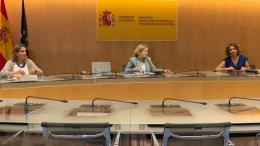Commitment to include in the income agreement the increase in the Interprofessional Minimum Wage (SMI)
6 (EUROPE PRESS)
The first vice president and minister of Economic Affairs and Digital Transformation, Nadia Calviño, proposed this Wednesday to the social agents –employers and unions– an income pact until 2025 that goes through a “moderation” of salary and business income to make in the face of escalating inflation.
“From the Government we think that a three-year agreement, until 2025, to moderate business and salary income is the contribution that the Spanish economy needs from social dialogue,” said the first vice-president after the meeting between the Government and social agents –CEOE, Cepyme, CCOO and UGT– to revisit the income pact in the face of a “complex” scenario for the coming quarters due to the fact that inflation is being more persistent and higher than expected.
In this meeting, which the person in charge of Economy has described as “useful and productive”, the Executive and social agents have addressed the inflationary escalation that the country is suffering and the consequences that the war in Ukraine is causing.
In this regard, the vice president stressed that “it is essential” that business margins do not widen and that wages grow moderately to avoid the persistence of inflation and sustain the “very positive” evolution of economic activity and employment .
Despite this scenario marked by the escalation of prices, Calviño has assured that “for the moment” no second-round effects have been installed, which, if they occur, is that inflation is more persistent even if its causes disappear initials.
In addition, the vice president advocates that the increase in the Minimum Interprofessional Salary (SMI) can be part of this income pact, stressing that the Government’s objective is to reach 60% of the average salary before the end of the legislature. “I hope that it is one of the elements that can be integrated into the income agreement,” she stressed.
From the socialist part of the Government, they were summoned to the meeting, in addition to Nadia Calviño, the third vice president and minister for the Ecological Transition and the Demographic Challenge, Teresa Ribera; the Minister of Finance and Public Administration, María Jesús Montero; the Minister of Transport, Mobility and Urban Agenda, Raquel Sánchez; the Minister of Education and Vocational Training, Pilar Alegría; the Minister of Territorial Policy and Spokesperson, Isabel Rodríguez; the Minister of Science and Innovation, Diana Morant and the Minister of Inclusion, Social Security and Migration, José Luis Escrivá. On his side, on behalf of United We Can, the Minister of Universities, Joan Subirats, was summoned.
“We have had a long, intense, fruitful and very productive meeting that has to send a message of trust and hope”, underlined the vice president, after committing to continue working with social agents on those measures that can facilitate the income agreement.
In addition, during the meeting, the Third Vice President and Minister of Ecological Transition, Teresa Ribera, announced to the social agents a meeting that will take place next week to discuss the contingency plan in the energy field that is being implemented throughout Europe in the face of a possible worsening of the situation in the energy markets in the coming months.
NEW PERTE MONITORING COMMITTEE
During the meeting, the Government has also discussed with social agents the deployment of the Recovery Plan, whose percentage authorized by the General State Administration (AGE) for investments is close to 51.5% of the total budgeted for this year.
In addition, it has been agreed to create a monitoring committee for the Perte in which social agents participate in order to have a good follow-up of the most important projects of the plan.
The process of preparing the addendum to the Recovery Plan was also commented on at the meeting, for which the Vice President highlighted the participatory process of dialogue that is already underway with the autonomous communities and that will continue to be promoted in the coming weeks also with political groups and social agents.
Likewise, Calviño has announced that in July the Ministry he heads is expected to convene the two sectoral roundtables for regulatory improvement and the one for digital transformation.
UNIONS, OPEN TO TALKING ABOUT THE INCOME AGREEMENT
At a press conference after the meeting, the unions have criticized that the Government “has not advanced or advanced a single proposal” on how the income pact that the Executive is requesting from the social agents could be channeled.
Despite this, CCOO and UGT have been “open” to talk about an income pact, which does not go through a containment of wages exclusively and which addresses corporate taxation and control of corporate profits. The next time they meet will be after the summer, according to the unions, although there is still no concrete.
Likewise, the secretary of Union Action of the CCOO, Mari Cruz Vicente, and the deputy secretary general of Union Policy of the UGT, Mariano Hoya, have assured that they are “willing” to also reopen the negotiation process in the bipartite scope of the Employment Agreement and Collective Bargaining (AENC).
On the employers’ side, no CEOE or Cepyme representative has come out at a press conference to assess the meeting.
683738.1.260.149.20220706220843















Add Comment